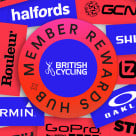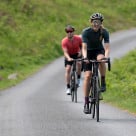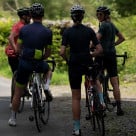Name:
Guy Watson
Location:
Havant, Hampshire
Qualifications:
Club Coach
Club Coach Level 2 Track
Level 3 Track Coach
First Aid Certificate
Contact
guywatson@cyberrider.net
HOW GOOD COULD YOU REALLY BE?
How good could you really be if you trained smart, following a bespoke training program designed just for you by a qualified and experienced coach? Although there are basic principles that everyone can apply to make improvements in performance, there is no single magic formula that works for everyone.
DO YOU NEED A COACH?
The right coach for you will be the one who can save you time finding the individual training formula that works for you as quickly as possible - and then help you manage your training year on year, continually evaluating and adapting the training when necessary to suit new targets and challenges, such as injuries and lifestyle changes. The right coach for you will also act as an independent consultant, offering objective feedback and then challenge you to improve in all areas, i.e. technique, tactics, self-reflection and evaluation of performance and results. With all new challenges come new mental stresses. For example: Only 1 rider can ever win a particular road race out of the 60 or so starters. You line up at races every week and you have yet to win a race and your main 'goal' for the season was to win an E/1/2 race. The season is drawing on, you start to wonder if you've set the bar too high, even though you feel as if your training is going really well... you start too loose morale.... there's allways next season...
Here's an example of where a coach can help you get back on course: First, your goals needed to be established correctly: 'To win an E/1/2 Road Race' is a loosely defined 'OUTCOME GOAL,' i.e. a goal that compares your performance with other riders in an event. This is the most common type of goal that a rider will set themselves. A coach will help the rider to make the goal SMARTER and will add dates and establish minor and major targets. One important thing to remember about Outcome Goals is that by definition you only have a very limited amount of control over achieving them because as well as needing to avoid bad luck, it will also depend on how other individuals and teams perform.
There are other types of goals that are all too often overlooked:
PERFORMANCE GOALS, are used to give an athlete alternative targets for measuring improvements in individual performance. E.G. if you continually get beaten in sprint finishes, a performance goal might be to reduce your 200m time by 1 second. Unlike Performance Goals, an athlete has a lot of control over achieving a Performance Goal.
PROCESS GOALS are used to evaluate and improve the execution of a skill or tactic. For example, do you waste energy early on in the race because you can't clip in as quickly as others and have to spend a lap moving up through the bunch? Do you waste energy sprinting out of the saddle and holding the hoods with your elbows out, when you could use the drops for more extension (possibly swapping back to the hoods to get more aero if you are up to speed and away in clear air?) Another example would be that when you finish a race and are asked how you felt your positioning was during the race, you felt it was OK. Notational analysis from video footage however revealed that you were moving back down the field toward the rear half, just at the time a key rival attacked - maybe they attacked before you could recover from that effort you had just made on the front? - maybe they were marking you? Process Goals are all about working on improveing the things that you can nearly always control and directly influence - they are not always easy to identify and set though.
PUTTING IT ALL TOGETHER:
Putting it all together, by controlling the controllable: PROCESS + PERFORMACE = OUTCOMES start to become more consistently achievable If you (or your parent or Team Manager) just focus on Outcome Goals week in week out, you can miss what's happening in the wider picture, e.g. are there any consistent trends that are impacting on your performances?
WHAT MAKES ME AN EFFECTIVE COACH?
In my day job I am a Senior Consultant, helping global companies such as Ford and Jaguar Land Rover, avoid risk and also evaluate risk when looking for opportunities. I do this through observation of processes and collecting data from many sources, analysing it and applying methodology to create an overall risk profile that can be used to benchmark against other organisations and other internal departments. I believe that this knowledge, coupled with my British Cycling qualifications and experience gained from racing bikes and being around some high achievers in sport, helps me to be an effective coach. Coaching is not my main source of income and this means is that I don't need a business model that requires me to have more riders than I can genuinely provide real 1-2-1 coaching for. I mainly coach because I believe that I can add something of value and I enjoy it - I like the feedback that I get from riders I work with. I always like to do things properly and that takes time (typically about 2 to 3 hours a week per athlete for managing a 1-2-1 training program and providing feedback to the rider.) If I haven't got time to coach you - I'll let you know and point you in the direction of someone who possibly can (e.g. another BC Level 3 coach.)
AWARDS & ACHIEVEMENTS:
- Motor Pace B License (Competition Derny Pacer)
- Team Manager License
- British Cycling Club Coach Certificate 2004
- British Cycling Level 3 Core Certificate 2014
- British Cycling Level 3 Track Cycling Coach Certificate 2015
- Manchester, Calshot & Lea Valley accredited coach
- British Cycling Regional Coach of the Year 2007 & 2009
- Over 15 years experience of providing 121 coaching to all levels from Youth to Veteran, Novice to Elite
COACHING & PRESCRIBING TRAINING
N.B. It is important to differentiate between someone who is a British Cycling Level 3 Coach and someone who provides training plans. If we were to start working together, STEP 1 would be to complete the forms that are provided by British Cycling - i.e.: - Rider Profile (personal details, performance history, goals, coaching needs) - Lifestyle Audit (identify how much time you really have to train and recover)
STEP 2 would be a face to face meeting to review the information, establish what your coaching needs are and talk about different ideas for training sessions and goals etc.
STEP 3 - Sign the Coaching Agreement after establishing what coaching you need and what coaching is expected and how much will it cost
STEP 4 - I will then spend time putting together your Annual Training Plan and the first 12 weeks of your Structured Training program for review and comment. I use my own spreadsheet based system because it is simple and effective (See photo album.) Thereafter you send me feedback weekly and I review and send you back comments and modify the training as required.
STEP 5 - Together we build up knowledge and data and look for key strengths and weaknesses. We establish what works well and what needs improving. We then regularly evaluate training effectiveness and just as importantly, look at how you are managing yourself in races tactically.
Interested? - Please get in touch for a chat
BIO:
- Reasonable club level racer back in the day, still ride for fun. Part time Elite level coach and a full time Senior Consultant in my day job
- 1980: Joined Portsmouth Cycling Club – First Race at Mountbatten Centre Track
- 1982 - Youth Divisional Track Champion
- 1983 - Selected for British Cycling Southern Centre of Excellence - Forced to quit sport due to back injury
- 1987 - Southern England 20km Track Champion(Paddington,) Top 10 National 20km Scratch & 50km Points Race Championships - Selected for LeHarve '6' Madison
- 1988 - Back injury – forced to quit again
- 1999 - Started racing again and won the first road race I entered (Surrey League, Lyne Circuit)
- 2000 - Back injury - forced to quit Reformed Portsmouth School of Cycle Racing with John Hayles
- 2003 - Formed i-Team.cc
- 2004 - Qualified as British Cycling Club Coach - Started Power Coach company - Reseller for Ergomo power meters - Cycling correspondent for Portsmouth Evening News
- 2005 - Second Category Rider - regular top 5 local races - Rode London Westminster GP
- 2006 - Back injury - forced to quit, formed Team KLR with Rob Hayles - Assistant with Team CSC at Paris Roubaix, Qualified for Motor Pace B license, Gained Calshot & Manchester coach accreditation
- 2007 - Assistant with Team CSC at Tour de France
- 2013 - Qualified British Cycling Level 2 Track Coach
- 2014 - Qualified British Cycling Level 3 Core
- 2015 - Qualified British Cycling Level 3 Track Coach





